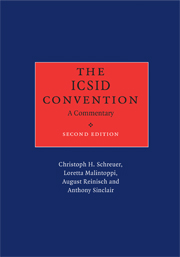Book contents
- Frontmatter
- Contents
- Foreword by Professor Sir Elihu Lauterpacht, CBE, QC
- Authors' preface to the second edition
- Table of cases
- List of abbreviations
- Text of the ICSID Convention
- Procedural calendar
- PREAMBLE
- CHAPTER I International Centre for Settlement of Investment Disputes
- CHAPTER II Jurisdiction of the Centre
- CHAPTER III Conciliation
- CHAPTER IV Arbitration
- Article 36 Request for Arbitration
- Article 37 Composition of Tribunal
- Article 38 Appointment by Chairman
- Article 39 Nationality of Arbitrators
- Article 40 Qualities of Arbitrators
- Article 41 Decision on Jurisdiction
- Article 42 Applicable Law
- Article 43 Evidence
- Article 44 Rules on Procedure
- Article 45 Default of a Party
- Article 46 Ancillary Claims
- Article 47 Provisional Measures
- Article 48 Award
- Article 49 Dispatch, Supplementation and Rectification
- Article 50 Interpretation
- Article 51 Revision
- Article 52 Annulment
- Article 53 Binding Force
- Article 54 Enforcement
- Article 55 State Immunity
- CHAPTER V Replacement and Disqualification of Conciliators and Arbitrators
- CHAPTER VI Cost of Proceedings
- CHAPTER VII Place of Proceedings
- CHAPTER VIII Disputes between Contracting States
- CHAPTER IX Amendment
- CHAPTER X Final Provisions
- Final Clause
- Consolidated bibliography
- Index by article
- Index by subject
Article 52 - Annulment
from CHAPTER IV - Arbitration
Published online by Cambridge University Press: 07 September 2010
- Frontmatter
- Contents
- Foreword by Professor Sir Elihu Lauterpacht, CBE, QC
- Authors' preface to the second edition
- Table of cases
- List of abbreviations
- Text of the ICSID Convention
- Procedural calendar
- PREAMBLE
- CHAPTER I International Centre for Settlement of Investment Disputes
- CHAPTER II Jurisdiction of the Centre
- CHAPTER III Conciliation
- CHAPTER IV Arbitration
- Article 36 Request for Arbitration
- Article 37 Composition of Tribunal
- Article 38 Appointment by Chairman
- Article 39 Nationality of Arbitrators
- Article 40 Qualities of Arbitrators
- Article 41 Decision on Jurisdiction
- Article 42 Applicable Law
- Article 43 Evidence
- Article 44 Rules on Procedure
- Article 45 Default of a Party
- Article 46 Ancillary Claims
- Article 47 Provisional Measures
- Article 48 Award
- Article 49 Dispatch, Supplementation and Rectification
- Article 50 Interpretation
- Article 51 Revision
- Article 52 Annulment
- Article 53 Binding Force
- Article 54 Enforcement
- Article 55 State Immunity
- CHAPTER V Replacement and Disqualification of Conciliators and Arbitrators
- CHAPTER VI Cost of Proceedings
- CHAPTER VII Place of Proceedings
- CHAPTER VIII Disputes between Contracting States
- CHAPTER IX Amendment
- CHAPTER X Final Provisions
- Final Clause
- Consolidated bibliography
- Index by article
- Index by subject
Summary
INTRODUCTION
The Place of Annulment in the Convention
In the Convention's drafting history, a provision on annulment of awards was first included in the Preliminary Draft (History, Vol. I, p. 230). It was closely modelled on Art. 35 of the ILC's 1958 Model Rules on Arbitral Procedure. That provision, in turn, was the result of abortive plans to create a permanent review procedure for international arbitral awards to be administered by the PCIJ and later the ICJ. The idea to create an international review procedure was never seriously challenged during the Convention's drafting (but see para. 4 infra). The drafts leading to what eventually became Art. 52 show no dramatic changes (History, Vol. I, pp. 230–241). The debates on these drafts concerned mainly the precise formulation of the grounds for annulment (see paras. 105, 106, 118, 119, 131, 193–195, 272, 279, 340, 399, 400 infra), the time limits for the submission of applications (see para. 435 infra), the appointment of members of ad hoc committees (see paras. 451, 461, 462 infra), partial annulment (see para. 494 infra) and stay of enforcement pending annulment proceedings (see paras. 574–576 infra).
- Type
- Chapter
- Information
- The ICSID ConventionA Commentary, pp. 890 - 1095Publisher: Cambridge University PressPrint publication year: 2009



